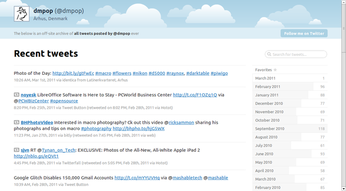Archive and Explore Your Tweets with Tweet Nest

Productivity Sauce
Tweet Nest allows you to back up your tweets in a MySQL database, and you can use this nifty Web-based application to display and explore you tweets. Tweet Nest runs on the Apache/MySQL/PHP stack, and it's pretty easy to install. Grab the latest version of the application, unpack the downloaded archive, and move the resulting directory to the document root of your server. Make then the inc/config.php writable by the server, and point your browser to your Twitter Nest installation (e.g., http://127.0.0.1/tweetnest). A simple wizard guides you through the setup process.
Next, you have to point your browser to the http://127.0.0.1/tweetnest/maintenance/loaduser.php URL to load the user account you created during the setup. Finally, point your browser to http://127.0.0.1/tweetnest/maintenance/loadtweets.php to load tweets, and wait till the application pulls the data from your Twitter account. To load new tweets on a regular basis, you can create a cron job on your server.
Thanks to its simplicity, Tweet Nest is rather straightforward in use. The main page displays a list of all your tweets and the right column offers you a monthly view with a total tweet count for each month. Click on a month, and you should see all tweets posted on the selected month complete with a slick timeline at the top. The latter shows the number of tweets and replies by date. There is also a search field which lets you search through your tweet archive.
Tweet Nest is not the most advanced solution out there, but if you are looking for a convenient way to archive your tweets as a searchable archive, it may be just the tool you need.
comments powered by DisqusSubscribe to our Linux Newsletters
Find Linux and Open Source Jobs
Subscribe to our ADMIN Newsletters
Support Our Work
Linux Magazine content is made possible with support from readers like you. Please consider contributing when you’ve found an article to be beneficial.

News
-
First Release Candidate for Linux Kernel 6.14 Now Available
Linus Torvalds has officially released the first release candidate for kernel 6.14 and it includes over 500,000 lines of modified code, making for a small release.
-
System76 Refreshes Meerkat Mini PC
If you're looking for a small form factor PC powered by Linux, System76 has exactly what you need in the Meerkat mini PC.
-
Gnome 48 Alpha Ready for Testing
The latest Gnome desktop alpha is now available with plenty of new features and improvements.
-
Wine 10 Includes Plenty to Excite Users
With its latest release, Wine has the usual crop of bug fixes and improvements, along with some exciting new features.
-
Linux Kernel 6.13 Offers Improvements for AMD/Apple Users
The latest Linux kernel is now available, and it includes plenty of improvements, especially for those who use AMD or Apple-based systems.
-
Gnome 48 Debuts New Audio Player
To date, the audio player found within the Gnome desktop has been meh at best, but with the upcoming release that all changes.
-
Plasma 6.3 Ready for Public Beta Testing
Plasma 6.3 will ship with KDE Gear 24.12.1 and KDE Frameworks 6.10, along with some new and exciting features.
-
Budgie 10.10 Scheduled for Q1 2025 with a Surprising Desktop Update
If Budgie is your desktop environment of choice, 2025 is going to be a great year for you.
-
Firefox 134 Offers Improvements for Linux Version
Fans of Linux and Firefox rejoice, as there's a new version available that includes some handy updates.
-
Serpent OS Arrives with a New Alpha Release
After months of silence, Ikey Doherty has released a new alpha for his Serpent OS.

